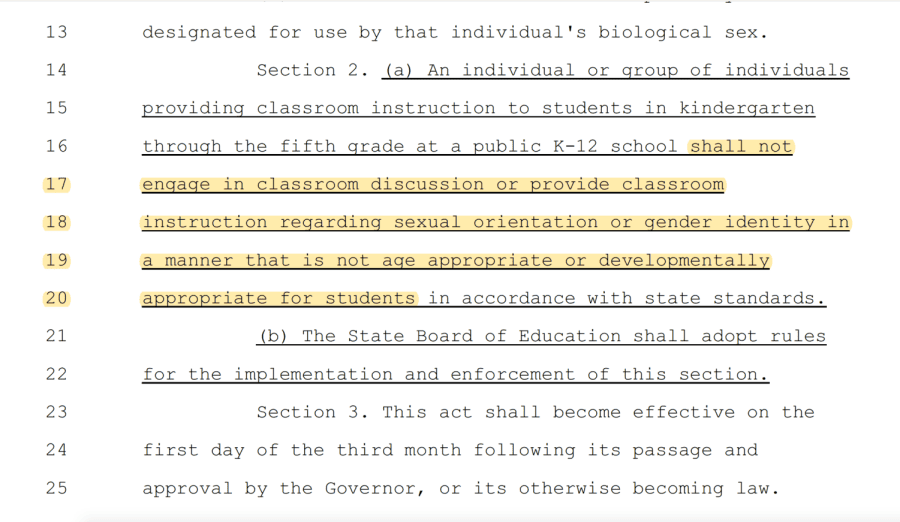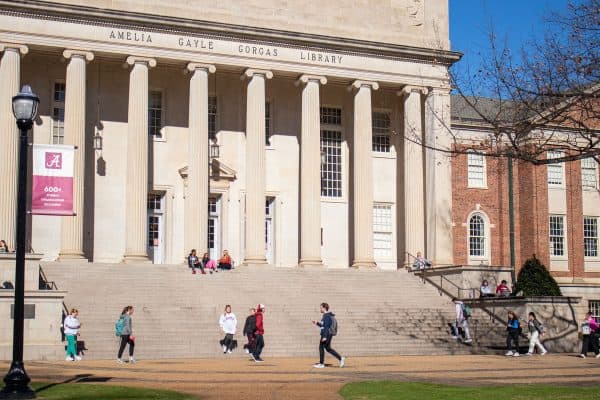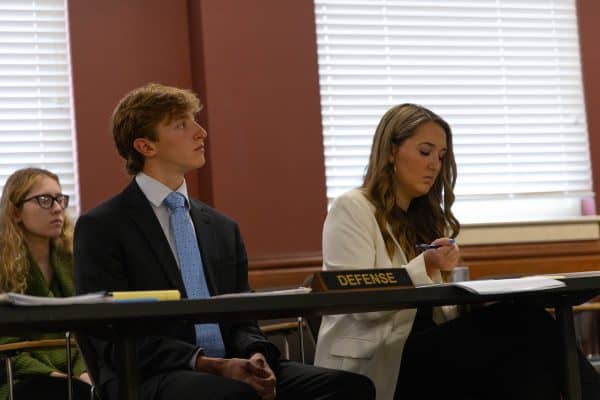OutLaw addresses anti-trans bills: ‘The legislature’s acceptance of our existence doesn’t change our existence’
April 10, 2022
The Alabama Legislature passed two anti-LGBTQ bills on the last day of its legislative session: House Bill 322, which passed less than 24 hours after its introduction, and Senate Bill 184. The next day, April 8, Gov. Kay Ivey signed them both into law.
HB 322, which passed 70-26 in the House before being sent to Ivey’s desk, mandates that “a public K-12 school shall require every multiple occupancy restroom or changing area designated for student use to be used by individuals based on their biological sex.”
Added on Thursday morning, an amendment to HB 322 also prohibits kindergarten through fifth grade teachers in public schools from engaging in classroom instruction or discussion “regarding sexual orientation or gender identity in a manner that is not age appropriate or developmentally appropriate for students in accordance with state standards.”
After signing HB 322, Ivey said that mandating transgender and nonbinary youth to use the bathroom of their birth sex is a “a no-brainer.” Ivey also said that criticism of HB 322 is “misleading, false and just plain wrong.”
In a statement on Thursday, the ACLU of Alabama called HB 322 an “egregious attack on Alabama transgender youth by state lawmakers.”
“By singling out transgender students for discrimination and excluding them from restrooms and locker rooms that match their gender identity, HB 322 discriminates based on transgender status and sex in violation of the United States Constitution and Title IX of the Civil Rights Act,” said Tish Gotell Faulks, the legal director of the ACLU of Alabama.
SB 184, known as the Alabama Vulnerable Child Protection Act, passed 66-28 in the House. The bill criminalizes providing gender-affirming care — including puberty blockers, hormones and surgeries — for transgender youth, making it a felony.
“The sex of a person is the biological state of being female or male, based on sex organs, chromosomes, and endogenous hormone profiles, and is genetically encoded into a person at the moment of conception, and it cannot be changed,” Section 2 of the bill states.
“I believe very strongly that if the Good Lord made you a boy, you are a boy, and if he made you a girl, you are a girl,” Ivey said after signing SB 184 “We should especially protect our children from these radical, life-altering drugs and surgeries when they are at such a vulnerable stage in life. Instead, let us all focus on helping them to properly develop into the adults God intended them to be.”
During debates Thursday, Rep. Chris England criticized the bills as “solutions that don’t have problems.” He said passing these bills would cause transgender youth to leave the state.
“I, for one, will continue, and many others will continue, to introduce legislation that gives the public their perception that Alabama is diverse and it is inclusive,” England said. “And we want you here. This bill puts a sign on the state sign that says, ‘Go somewhere else.’”
Rep. Neil Rafferty, the only openly gay legislator in the state’s House, said the bills were “invasive.”
Opponents of the bill warn of the consequences faced by trans youth, parents and healthcare providers. The Trevor Project, a national organization focused on suicide prevention among LGBTQ youth, released a statement condemning the ban on gender-affirming healthcare since it will strip transgender youth of resources that could reduce their risk of suicide.
According to the Trevor Project’s 2021 national survey on LGBTQ Youth Mental Health, 42% of LGBTQ youth seriously considered attempting suicide in the past year, including more than half of transgender and nonbinary youth.
The survey reports that 20% of transgender and nonbinary youth considered suicide, which is double the rate among cisgender youth.
“To trans and nonbinary youth in Alabama and across the country watching on this dark day: This is not over,” said Sam Ames, director of advocacy and government affairs for The Trevor Project. “We will fight as far as it takes, until the day every young person knows they are loved, supported, and worthy just as they are.”
A month before the bills were passed, OutLaw, an organization for LGBTQ members of the University of Alabama Law School community, sent an open letter to the Alabama House of Representatives.
Signed by the members of OutLaw’s executive board and other University organizations and professors, the letter urged state legislators to oppose the bills that would criminalize providing gender-affirming care to transgender youth.
“Passing this bill will not discourage the existence of transgender youth in Alabama; it will only ensure that those individuals suffer unnecessary pain as they wait to receive this care as adults,” the letter read. “The right to self-determination in healthcare for all Alabama citizens, free from the interference of the state, is one that must be protected by this Legislature.”
OutLaw is currently considering filing an amicus curiae brief in the ACLU of Alabama lawsuit. The organization is also looking at other options to oppose the laws, including partnering with other organizations to engage in community education.
Cole Adams, the president of OutLaw and a second-year law student, said he was “appalled” that the bills passed the legislature.
“To me, it’s a pretty thinly veiled attempt to rile up a conservative base in light of upcoming midterms,” Adams said.
Adams said requiring transgender students to use bathrooms according to their biological sex is dehumanizing and drew comparisons between the state legislature’s passage of the bills and the state’s response to the AIDS epidemic.
“The legislature’s acceptance of our existence doesn’t change our existence,” Adams said. “Trans kids are going to exist regardless of whether the law of the state that they’re in affirms or acknowledges their existence.”
Adams said what’s happening with current legislation is more disheartening than surprising to him, especially since there have been people fighting for years for queer civil rights, including the Supreme Court’s decisions in Obergefell v. Hodges in 2015 and Bostock v. Clayton County, Georgia in 2020.
“It’s almost like a slap in the face to all of that activism and fight that went into changing the system for the better in terms of recognition under the law,” Adams said.
For queer Alabamians, Adams said these bills being passed is a call to fight back.
“I think it’s almost a call for us to engage in that activism, to engage in fighting for our rights,” Adams said. “I obviously wish we wouldn’t have to, but I think we’re ready to.”
The ACLU of Alabama, along with several other civil rights organizations such as Lambda Legal, the American Civil Liberties Union and the Transgender Law Center, announced plans to take legal action against SB 184 on Thursday.
“This legislation is one of the most aggressive in the country and will directly negatively impact transgender youth, their families, and their supporters,” said Lynly Egyes, the legal director of the Transgender Law Center. “Threatening providers with prison time or fines as a result of their dedication to their patients is ruthless. Above all, our goal is to ensure that trans youth become trans adults, and bills like this are antithetical to trans people thriving in this country.”
Adams expressed confidence that HB 322 and SB 184 will have minimal impact due to the litigation already underway.
“They know that what they’ve given is not going to hold any water in a court of law when there’s the Constitution and the equal protection clause,” Adams said.
Similar bills passed in various states have been struck down by federal courts. Last year, a federal judge temporarily blocked a similar Arkansas ban on gender-affirming care for transgender youth. In March, a federal judge blocked the Texas Department of Family and Protective Services from investigating cases of parents giving gender-affirming care to youth as child abuse.
Questions? Email the culture desk at [email protected].











